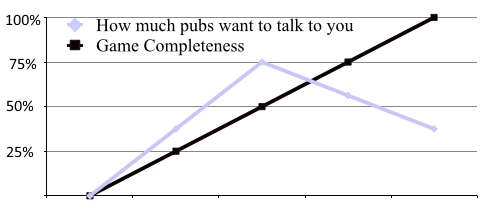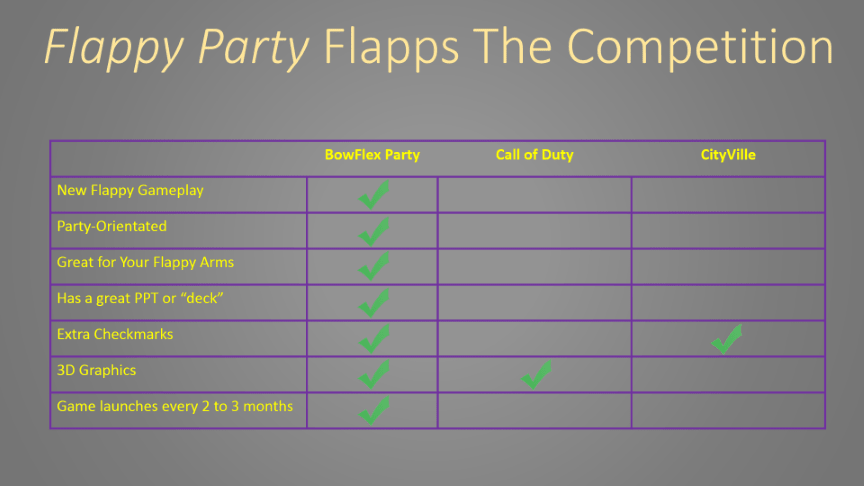It’s old news that in mobile games the traditional developer–publisher relationship has been turned upside down: developers no longer need the distribution networks of publishers to reach a mainstream audience because the app stores are baked into the devices. But the allure of direct access to such a vast and lucrative market has inevitably led to cutthroat competition.
Acquisition costs on iOS and Android have skyrocketed over the last few years. Meanwhile, development costs for competitive freemium titles have also ballooned past the million dollar mark for many games. This squeeze hits both developers and publishers, and that means it’s never made more sense for these groups to find creative ways to work together. At AC&A, we have over thirty combined years of experience in development and publishing. Having been on both sides of this relationship, we can offer some key tips for developers looking to build relationships with publishers.
1. Deliver the goods. I reached out to Jesse Divnich, VP of Product Strategy at Tilting Point, about what tips he’d like to share with studios who seek out partnerships. He offered some key points about the materials you should be prepared to provide:
“A well-produced gameplay trailer or playable demo is always among the highest requested items. At the very least some gameplay video is required. Even if the game is early in production, publishers are able to look past any flaws. It helps to have a presentation, just in case they can’t envision the goals and key features you are trying to achieve. Always dedicate at least a few slides to the product roadmap and the background history of key members of your team.”
Publishers want to see that you have running code, and they are thrilled if you can demonstrate your game’s sense of style – even if you’re only showing that style through clever language and presentation. The old rule from theatre applies here: Show, don’t tell. It’s much better to show a single spooky image than to say that your product will be “the creepiest game ever.”
2. The timing of your approach matters. There is a Goldilocks effect at play when you approach publishers during your development process. On one hand, if you approach too soon, you may not have the materials you need to really grab their attention. But on the other hand, if you approach too late, you may lose out on a lot of great expertise that could make your game a hit. Publishers generally want to be involved in your product, and if you’re open to that yourself, you’ll get their attention. Look for the moment when you’ve got great great materials, but well before your game is coming out of the production phase.
3. Demonstrate integrity. Publishers are very savvy about the business of mobile games, so don’t bother trying to impress them with unrealistic promises and presentations. It only shows a lack of business savvy.
“One element that is my personal pet peeve is when developers include forecasts (often unrealistic ones). … Forecasting is incredibly tough to pull off in mobile and they are always taken with a grain of salt when it comes from the developer. Instead, talk about market sizes and sales of comparable games so publishers can get a sense of the size of the genre.”
–Jesse Divnich, VP of Product Strategy at Tilting Point
When I was on the receiving end of pitches at Ubisoft, I was consistently surprised at the absurd graphs and checklists some pitches contained. Even if I believed in the product, these materials caused me to question the executive team behind it.
4. Relax. Game publishing is serious business, but it’s also something we do out of passion. Ultimately, publishing companies are made up of people who love games, just like your studio. You have a lot in common with them, and if you approach with an open and a relaxed attitude, you’ll be able to connect with them over two key areas: your product vision and the specific areas of expertise where they can help you succeed. If you can connect authentically over these areas, a business arrangement can happen quite naturally. And if your game is a success, everybody wins.
5. Want more than money. Developers sometimes see publishers as just a place to go get money. This shows game biz naiveté and diminishes the value of your potential partner. Jesse sent me this really interesting tip:
“Publishers will always ask what you need. I would not recommend making money [as being] the first thing you ask for – even if you do need it. Publishers do not like to be viewed as merely a bank.“
Think of your initial interactions with a publisher as the start of a relationship, because if those interactions go well, that’s exactly what it will be. Publishers have a great deal to offer you beyond money, including backend services, platform relations, acquisition strategy, and a huge amount of hard-won know-how. Show interest in the publisher’s expertise and market position, and you’ll be off to a great start at earning their trust and interest.




